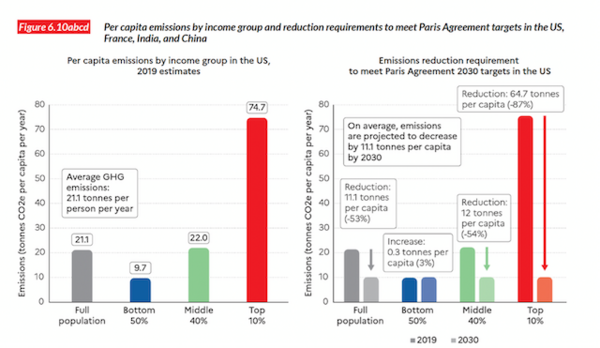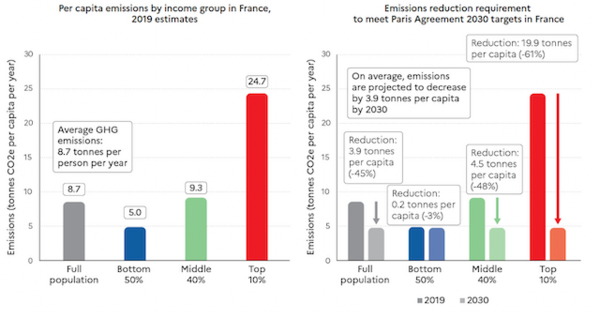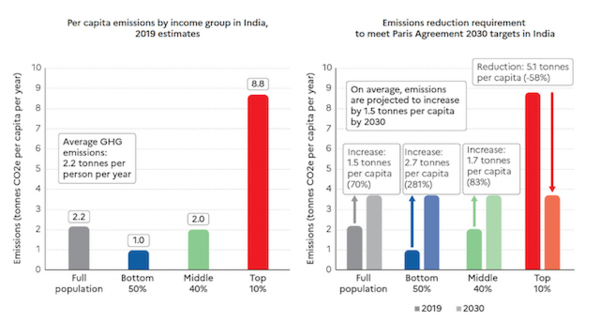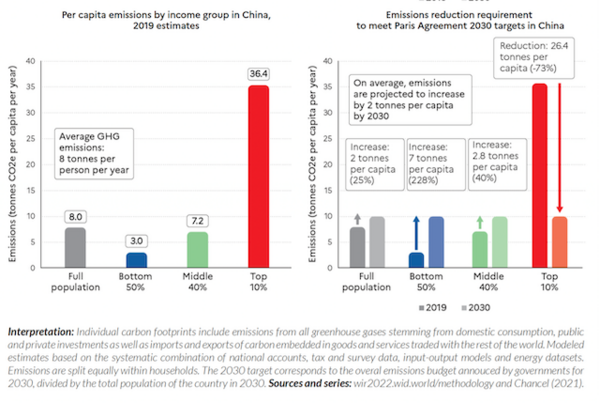Sommaire
Radical taxation of the richest persons and large companies is essential
In order to rapidly finance a new ecological and climatic direction and reduce inequalities through investment in education, health and social benefits, radical taxation of the richest persons and the biggest companies is necessary. Such taxation would not only make it possible to finance this expenditure, but also to reduce the damage caused by the dominant classes who are, as we have seen, the main polluters of the planet. Regulating the lifestyles of the wealthiest (private jets, excessive use of air transport) [1] and taxing them as much as possible to limit their nuisance capacity, while controlling capital movements to prevent them fleeing when these measures are taken, are realistic solutions. In a context of ecological urgency, raising taxes on the richest would be a perfectly justified political measure that would undoubtedly find the support of the majority of the population and has been successfully implemented before. Just to mention Franklin Roosevelt who In 1941 raised the marginal income tax rate for the richest to 91% [2] to finance the war effort,
The various graphs below, taken from the World Inequality Report 2022, show that in the majority of the regions studied, efforts to achieve the Paris Agreement targets for 2030 will have to fall largely on the richest 10%. It should be remembered, however, that each country’s targets varied according to its level of emissions at the time of COP 21 in Paris in 2015.
In the United States, in order to comply with the Paris agreements, the richest 10% must divide their average level of CO2 emissions per year by seven by 2030. The next 40% must halve their average emissions by 2030. For the poorest half of the US population, the aim is to maintain their average annual emissions at the same level. We can see here that efforts must fall on the richest, and more generally on the richer half of the population. Radical taxation is one way of limiting the emissions of these sections of the population while, at the same time, mobilising resources for the public spending needed to combat climate change.
In France, the proportions are fairly similar, with lower greenhouse gas emission targets (an average of 5 tonnes of CO2 per person per year, compared with 10 tonnes for the United States).
If we look at India, the situation is different. Achieving the objectives of the Paris agreements depends entirely on the country’s richest 10%. The remaining 90% even have some “leeway” to remain within the Paris Agreement target for 2030. For India, targeting the richest 10% and the biggest companies through high taxation is a solution to the urgent challenge of climate change.
The Chinese example is quite similar to that of India, even though China negotiated less ambitious targets than India at COP 21 (10 tonnes of CO2 per person per year on average, compared with 3.7 for India). To achieve these targets, the richest 10% of the Chinese population will have to divide their average annual emissions by 3.5. The remaining 90% of the population are well on track to meet the targets.
These few graphs – even though it is important to remember the limits of country-by-country comparisons, as not all the countries mentioned above have the same targets in terms of average individual CO2 emissions – show very clearly that it is the richest countries that are responsible for climate change and that they must bear the consequences.
They won’t do it willingly. They have to be forced. Taxation is an effective tool, as has been proven historically with very high marginal income tax levels in several Western countries before and after the Second World War. We need to radically tax income and wealth, including the financial wealth of the very rich, which has become increasingly important since the 1980s. At the same time capital movements must be strictly controlled so that the rich cannot evade these measures of social and climate justice. One solution is to strictly regulate financial transactions. For example, prohibiting all international financial transactions with tax havens. In addition to these measures of social justice at the national level a measure of historical justice from the North to the South must be added such as cancelling the debts of the countries of the South and even introducing reparations.
Cancelling the debts of developing countries and setting up a system of reparations
As we have seen above, the countries of the South are only marginally responsible for climate change, but it is they who suffer its main consequences. It is therefore intolerable that they should subsidise the States, multilateral institutions and private creditors of the North (the latter hold around 62% of the external public debt of countries classified as developing by the World Bank
World Bank
WB
The World Bank was founded as part of the new international monetary system set up at Bretton Woods in 1944. Its capital is provided by member states’ contributions and loans on the international money markets. It financed public and private projects in Third World and East European countries.
It consists of several closely associated institutions, among which :
1. The International Bank for Reconstruction and Development (IBRD, 189 members in 2017), which provides loans in productive sectors such as farming or energy ;
2. The International Development Association (IDA, 159 members in 1997), which provides less advanced countries with long-term loans (35-40 years) at very low interest (1%) ;
3. The International Finance Corporation (IFC), which provides both loan and equity finance for business ventures in developing countries.
As Third World Debt gets worse, the World Bank (along with the IMF) tends to adopt a macro-economic perspective. For instance, it enforces adjustment policies that are intended to balance heavily indebted countries’ payments. The World Bank advises those countries that have to undergo the IMF’s therapy on such matters as how to reduce budget deficits, round up savings, enduce foreign investors to settle within their borders, or free prices and exchange rates.
) by multiplying their debts contracted with them and paying the interests. In April 2023, 93% of the countries most vulnerable to the climate crisis were in a situation of over-indebtedness or were at serious risk of falling into over-indebtedness. [3]
After the Covid-19 crisis that disrupted supply chains, the war in Ukraine caused further increases in the prices of cereals, which were again largely accentuated by speculation, and above all the rise in interest rates
Interest rates
When A lends money to B, B repays the amount lent by A (the capital) as well as a supplementary sum known as interest, so that A has an interest in agreeing to this financial operation. The interest is determined by the interest rate, which may be high or low. To take a very simple example: if A borrows 100 million dollars for 10 years at a fixed interest rate of 5%, the first year he will repay a tenth of the capital initially borrowed (10 million dollars) plus 5% of the capital owed, i.e. 5 million dollars, that is a total of 15 million dollars. In the second year, he will again repay 10% of the capital borrowed, but the 5% now only applies to the remaining 90 million dollars still due, i.e. 4.5 million dollars, or a total of 14.5 million dollars. And so on, until the tenth year when he will repay the last 10 million dollars, plus 5% of that remaining 10 million dollars, i.e. 0.5 million dollars, giving a total of 10.5 million dollars. Over 10 years, the total amount repaid will come to 127.5 million dollars. The repayment of the capital is not usually made in equal instalments. In the initial years, the repayment concerns mainly the interest, and the proportion of capital repaid increases over the years. In this case, if repayments are stopped, the capital still due is higher…
The nominal interest rate is the rate at which the loan is contracted. The real interest rate is the nominal rate reduced by the rate of inflation.
decided by the US Federal Reserve
FED
Federal Reserve
Officially, Federal Reserve System, is the United States’ central bank created in 1913 by the ’Federal Reserve Act’, also called the ’Owen-Glass Act’, after a series of banking crises, particularly the ’Bank Panic’ of 1907.
FED – decentralized central bank : http://www.federalreserve.gov/
and the European Central Bank
Central Bank
The establishment which in a given State is in charge of issuing bank notes and controlling the volume of currency and credit. In France, it is the Banque de France which assumes this role under the auspices of the European Central Bank (see ECB) while in the UK it is the Bank of England.
ECB : http://www.bankofengland.co.uk/Pages/home.aspx
. The countries of the South are seeing their debt levels explode. Faced with payment difficulties, they are cutting back on public spending [4], notably health and education and are once again having to call for IMF
IMF
International Monetary Fund
Along with the World Bank, the IMF was founded on the day the Bretton Woods Agreements were signed. Its first mission was to support the new system of standard exchange rates.
When the Bretton Wood fixed rates system came to an end in 1971, the main function of the IMF became that of being both policeman and fireman for global capital: it acts as policeman when it enforces its Structural Adjustment Policies and as fireman when it steps in to help out governments in risk of defaulting on debt repayments.
As for the World Bank, a weighted voting system operates: depending on the amount paid as contribution by each member state. 85% of the votes is required to modify the IMF Charter (which means that the USA with 17,68% % of the votes has a de facto veto on any change).
The institution is dominated by five countries: the United States (16,74%), Japan (6,23%), Germany (5,81%), France (4,29%) and the UK (4,29%).
The other 183 member countries are divided into groups led by one country. The most important one (6,57% of the votes) is led by Belgium. The least important group of countries (1,55% of the votes) is led by Gabon and brings together African countries.
http://imf.org
assistance and be subjected to their conditionalities – VAT hikes, cuts in public budgets, greater emphasis on export crops to raise the foreign currency needed to repay the debt… Since the start of the pandemic, the IMF has signed agreements with nearly 100 countries [5].
In the face of these injustices, the first thing to do is to cancel the debts that are de facto illegitimate given the history of colonization and the domination of the North over the South. All the more so when we consider that the total external public debt of the countries of the South (USD3,447 billion) is only less than 10% of the total public debt of the United States ( USD36,000 billion). This is almost equivalent to the French public debt at the beginning of 2025, which amounts to USD 3,5 trillion or 30% of the total volume of assets managed by BlackRock, i.e 11,5 trillion [6].
By way of comparison, a low wealth tax of 2% on the world’s millionaires, 3% on those with a fortune of more than USD50 million and 5% on the world’s billionaires would bring in USD1,700 billion every year [7], half of the total external public debt of the countries of the South. The external public debt of so-called developing countries is a drop in the ocean of finance, but represents an enormous burden for these States, their populations and ecosystems. It must be cancelled to liberate urgently needed public funds for health and education services, for the establishment of genuine food sovereignty, and for financing an ecological bifurcation.
Of course, cancelling the debt of the countries of the South is not enough. It must be accompanied by reparations from the imperialist and neo-colonial States of the North to the States of the South. It must also be accompanied by the expropriation of the banking and energy sectors. Expropriation and socialisation of the banks under citizen control, because everything that is financed by the banks (projects that guarantee profit
Profit
The positive gain yielded from a company’s activity. Net profit is profit after tax. Distributable profit is the part of the net profit which can be distributed to the shareholders.
) exists and is the largely bigger part of economic activity, unlike what is not financed, which remains a mere pittance or non-existent, such as cooperatives, associations and so on. Expropriation of the energy sector under citizen control because, along with agriculture, it is the lifeblood of people’s well-being and one of the main factors in the destruction of the planet, since energy is needed to power container ships, aircraft, private cars, factories, homes, etc. As Jawad Moustakbal explains, “the energy sector should be seen as a public service, co-managed by the workers of the sector and the local populations who have agreed to share
Share
A unit of ownership interest in a corporation or financial asset, representing one part of the total capital stock. Its owner (a shareholder) is entitled to receive an equal distribution of any profits distributed (a dividend) and to attend shareholder meetings.
part of their territories (land, water, forests, etc.) for the collective interest
Interest
An amount paid in remuneration of an investment or received by a lender. Interest is calculated on the amount of the capital invested or borrowed, the duration of the operation and the rate that has been set.
. Within this framework, local populations must also benefit from preferential tariffs, or even free electricity services [8] ”.
The populations of the North will not be able to avoid a process of degrowth. The current ecological transition creates intolerable mechanisms of child labour exploitation, extractivism and neo-colonialism. These measures must also be combined with radical feminist, ecological, social and popular policies which, as we have seen above, call for the richest to make significant contributions.
Translation : Mike Krolikowski
The authors thank Jawad Moustakbal, Pablo Laixhay and Christine Pagnoulle for their remarks.
Bibliography :
Action Aid Policy Brief, “The vicious cycle : connections between the debt crisis and climate crisis”, Action Aid, April 2023, p.2. https://actionaid.org/sites/default/files/publications/The_vicious_cycle.pdf
Adam Hanieh, Laundering Carbon—The Gulf’s ‘New Scramble for Africa’, CADTM, 14 August 2024, https://www.cadtm.org/Laundering-Carbon-The-Gulf-s-New-Scramble-for-Africa, consulted 16 October 2024.
Andre Standing, Sovereign ESG bonds in the global south : 10 questions for those concerned about debt and climate justice, Eurodad, 2023, p.19, https://assets.nationbuilder.com/eurodad/pages/3227/attachments/original/1701795920/ESG_Brief_V3.pdf?1701795920
Andreas Malm, L’Anthropocène contre l’histoire, La Fabrique, 2017.
Andreas Malm, Comment saboter un pipeline, La Fabrique, 2020.
Andreas Malm, La Chauve-souris et le capital, La Fabrique, 2020.
Anne Theisen, Quelles alternatives face aux fausses solutions promues par la Banque africaine de développement ?, CADTM, 19 février 2024, https://www.cadtm.org/Quelles-alternatives-face-aux-fausses-solutions-promues-par-la-Banque-africaine (in French only), consulted 16 October 2024.
CADTM International, Mettre fin aux politiques migratoires inhumaines du Nord. Aucune personne n’est illégale, CADTM, 29 june 2022, https://www.cadtm.org/Mettre-fin-aux-politiques-migratoires-inhumaines-du-Nord-Aucune-personne-n-est (in French)
Chancel, L., Bothe, P., Voituriez, T, Climate Inequality Report 2023, World Inequality Lab Study 2023/1, https://wid.world/wp-content/uploads/2023/01/CBV2023-ClimateInequalityReport-3.pdf
Chancel, L., Piketty, T., Saez, E., Zucman, G. et al. World Inequality Report 2022, World Inequality Lab wir2022.wid.world, https://wir2022.wid.world/methodology/.
Debt Justice, Climate vulnerable countries debt paiments highest in three decades, June 2024, https://debtjustice.org.uk/press-release/climate-vulnerable-countries-debt-payments-highest-in-three-decades.
Debt Justice, Lower income countries spend five times more on debt than dealing with climate change, October 2021, https://debtjustice.org.uk/press-release/lower-income-countries-spend-five-times-more-on-debt-than-dealing-with-climate-change
Dorothy Guerrero, “The World Bank should not host the Loss and Damage Fund”, Global Justice Now, 3 November 2023, https://www.globaljustice.org.uk/blog/2023/11/the-world-bank-should-not-host-the-loss-and-damage-fund/
Daniel Tanuro, L’impossible capitalisme vert, Éditions La Découverte, 2012.
Éric Toussaint, Climate and environmental crisis: Sorcerer’s apprentices at the World Bank and the IMF, CADTM, 26 June 2024, https://www.cadtm.org/Climate-and-environmental-crisis-Sorcerer-s-apprentices-at-the-World-Bank-and
Éric Toussaint, Debt ceiling: Radio Silence Concerning United States President Franklin Roosevelt’s Repudiation of Debts, CADTM, 28 May 2023,https://www.cadtm.org/Debt-celling-Radio-Silence-Concerning-United-States-President-Franklin
Fadhel Kaboub by Katherine Hearst, “Kenya concedes ‘millions of hectares’ to UAE firm in latest carbon offset deal,” Middle East Eye, November 5, 2023.
Fiona Harvey, “Developing countrier will need $2tn a year in climate funding by 2030”, The Guardian, 8 November 2022, https://www.theguardian.com/environment/2022/nov/08/developing-countries-climate-crisis-funding-2030-report-nicholas-stern.
FMI, Annual report 2023 of the International Monetary Fund, page 3, https://www.elibrary.imf.org/display/book/9798400238918/9798400238918.xml
Hamza Hamouchene, « En Tunisie, Algérie et Maroc, transition énergétique rime avec néocolonialisme », Reporterre, 11 December 2023, https://reporterre.net/En-Tunisie-Algerie-et-Maroc-transition-energetique-rime-avec-neocolonialisme? (in French) French)utm_source=newsletter&utm_medium=email&utm_campaign=nl_quotidienne (in French)
Iolanda Fresnillo, “Miracle of Mirage : are debt swaps really a silver bullet”, December 2023, Eurodad, https://www.eurodad.org/miracle_or_mirage.
Jawad Moustakbal, The Moroccan energy sector: A permanent dependence, 7 December 2021, CADTM, https://www.cadtm.org/The-Moroccan-energy-sector-A-permanent-dependence.
Laurent Gayer, « Au Pakistan, le retour des bruits de bottes », Le Monde diplomatique, November 2023, https://www.monde-diplomatique.fr/2023/11/GAYER/66283 (in French)
Lora Verheecke, « Décarboner = recoloniser ? », pour Entraide & Fraternité. https://entraide.be/wp-content/uploads/sites/4/2024/02/Etude2024_DecarbonerRecoloniser.pdf (in French), consulted 16 October 2024.
Margaux Lacroux, Fabio d’Andrea, « Changement climatique : Canicule en Inde et au Pakistan : « Ces régions pourraient devenir complètement inhabitables », Libération, 28/04/2022, https://www.liberation.fr/environnement/climat/canicule-en-inde-et-au-pakistan-des-regions-pourraient-devenir-completement-inhabitables-(in French for subscribers) 20220428_T4AGFF47YBBNTNUAM4VRJUCEVU/
Michael Peel, Philip Georgiadis, “Private jet emissions soar almost 50% in four years”, Financial Times, 7 November 2024, https://www.ft.com/content/13a89ac6-6fa8-4e17-9ef2-698d20b657a7.
Missing Migrants Project, « Deaths during migration recorded since 2014, by region of incident », https://missingmigrants.iom.int/data,
Nations Unies, « L’Afrique pâtit du changement climatique de manière disproportionnée », 04/09/2023, https://news.un.org/fr/sto(ry/2023/09/1138192 (in French)
Ouest-France, « Migrants aux États-Unis : l’Arizona envoie la Garde nationale à la frontière avec le Mexique », 15 décembre 2023, https://www.ouest-france.fr/societe/immigration/migrants-aux-etats-unis-l-arizona-envoie-la-garde-nationale-a-la-frontiere-avec-le-mexique-1131dbad-7ad2-4efc-aa7e-c26cd2fb2683(in French)
Oxfam, “Climate Equality : A planet for the 99%”, Oxfam, November 2023, p.50, https://www.oxfamfrance.org/app/uploads/2023/11/Full-report-english.pdf
Paul Martial, « COP28 : le capitalisme vert contre l’Afrique », L’Anticapitaliste, 14 décembre 2023, https://lanticapitaliste.org/actualite/ecologie/cop28-le-capitalisme-vert-contre-lafrique, consulted 16 October 2024.(in French)
ReCommons Europe, End the inhumane migratory policies of Fortress Europe
, CADTM, 30 jJuly 2021https://www.cadtm.org/End-the-inhumane-migratory-policies-of-Fortress-Europe
Vincent Lucchese, « Éliminer le carbone de l’atmosphère, solution ou impasse », Reporterre, 6 décembre 2023, https://reporterre.net/Eliminer-le-carbone-de-l-atmosphere-solution-ou-impasse.(in French)





